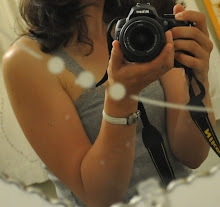Intrusion
I look at it, my eyes squinting a little, although there is no need to squint. While the other pegs are wooden, occasionally chipped, and darkened by use and moisture, this one is pink, plastic, and assertive in its glossiness. It blatantly doesn't belong but it seems to have settled in comfortably there, on the line with the others. Thinking back to last summer when we went camping to the National Park Hautes Gorges, I remember the first time I saw it: a curiously misplaced pink object lying in the scraggly wet grass in our allotted camping site. When we pitched the tent, M strung out our improvised laundry line between two trees and immediately employed it ("confiscated" it, was the word that came to mind ) by pegging a dish towel on the line. And so it stayed there for the next 3 days -- a small hub of light pink colour against the wet-green heaviness of the bushes and branches on the bank of the Malbaie River running busily over the boulders behind our tent. The day we were leaving I didn't protest much when M packed the pink peg with our stuff and put it in the trunk (leaving plastic behind didn't make much sense), but I didn't exactly want it, this peg -- a cast-off from other lives, a misappropriated morsel of someone else's day.
Perhaps the origins of this reluctance are partly in the story my grandmother told me (no doubt, with didactic intentions) when I was little: once, when she and my uncle, who was then about 7, were crossing a street in Belgrade, he spotted a new fountain pen by the curb and wanted to pick it up. My grandmother, fiercely proud of her moral uprightness and transparency, told him sternly to leave the pen where it was -- what was he thinking, ogling another person's possession? But someone else will come by and take it, pleaded my uncle, in vain, his neck craned all the way back as she tugged him away by the hand, implacable in her sternness and satisfied by the lesson he (and I) could learn from it.
But it's not only that -- there is more to my suspicion of the peg. There is something that doesn't present itself in an easily traceable line of a carefully constructed narrative with a moral -- like my grandmother's story -- fed to a child who then remembers it into adulthood; it is something that reaches deep into the unexplored knots and uneven surfaces of the mind, suggested but never fully articulated, and grating on your consciousness from time to time, like a tiny pebble in a shoe. Something that is more intimately related to the way I was always suspicious of the tablespoon my father brought from the war many years ago. One day I opened the cutlery drawer, always cluttered with a rattling mass of metal utensils (it was a known, familiar mess), and immediately spotted the intruder. The new spoon was much rounder and its metal surface perfectly polished with no scratches or incisions. An unfamiliar, alien "spoon-face" drawing attention to itself in the crowd of the well-known ones which I had been seeing since before I can remember; which, in nebulous ways of character formation, came to embody my earliest beginnings and my identity. (I've long since stopped being surprised by a striking resemblance between my favourite fork, used since infancy, and myself. Something in the leaf pattern around the rim of the handle captures the whole of my childhood, for example). And so, the sudden apparition of the strange spoon in the midst of the familiar ones seemed to endanger the integrity and stability of the entire "ecosystem" of identificatory cues deployed in my head.

The problem was, of course, that it was never clear where exactly that spoon came from. My father never wanted to talk about the war (into which he was mobilized about 6 months before it ended in 1995), and to my knowledge, he only said two things on the subject. One was a general assessment of war as "a dirty affair, full of shouting, cursing and confusion, where nobody knew what he was doing." The other one was a small anecdote about the war horse named Zeko ("Bunny"), who was so startled by a sudden shelling that he jumped and ran away never to return, living up to his name. The details of the gore and the ugliness he wanted to spare us were public knowledge, however; among them were the stories of soldiers and others raiding the abandoned houses in villages and small settlements scattered around the movable front lines. People went away with TVs, stereos, furniture, and even hot-water boilers which they then installed in their own houses. A savage plundering instinct or a desperate yearning for compensation, these acts always resulted in someone suddenly ending up with a cemetery of foreign objects, smelling of their previous owners and their tragedies, now forced into strangers' living rooms, bathrooms, or kitchens.
I didn't ask and never knew if the intrusive spoon had anything to do with the above, but it was enough to know it came with the imprint of someone else's hand on it. What I do know now is that even such an almost imperceptible intrusion can infect the way you view many things afterwards, including something as small as a peg -- of which I am reminded every time I put laundry on the line.



0 Comments:
Post a Comment
<< Home